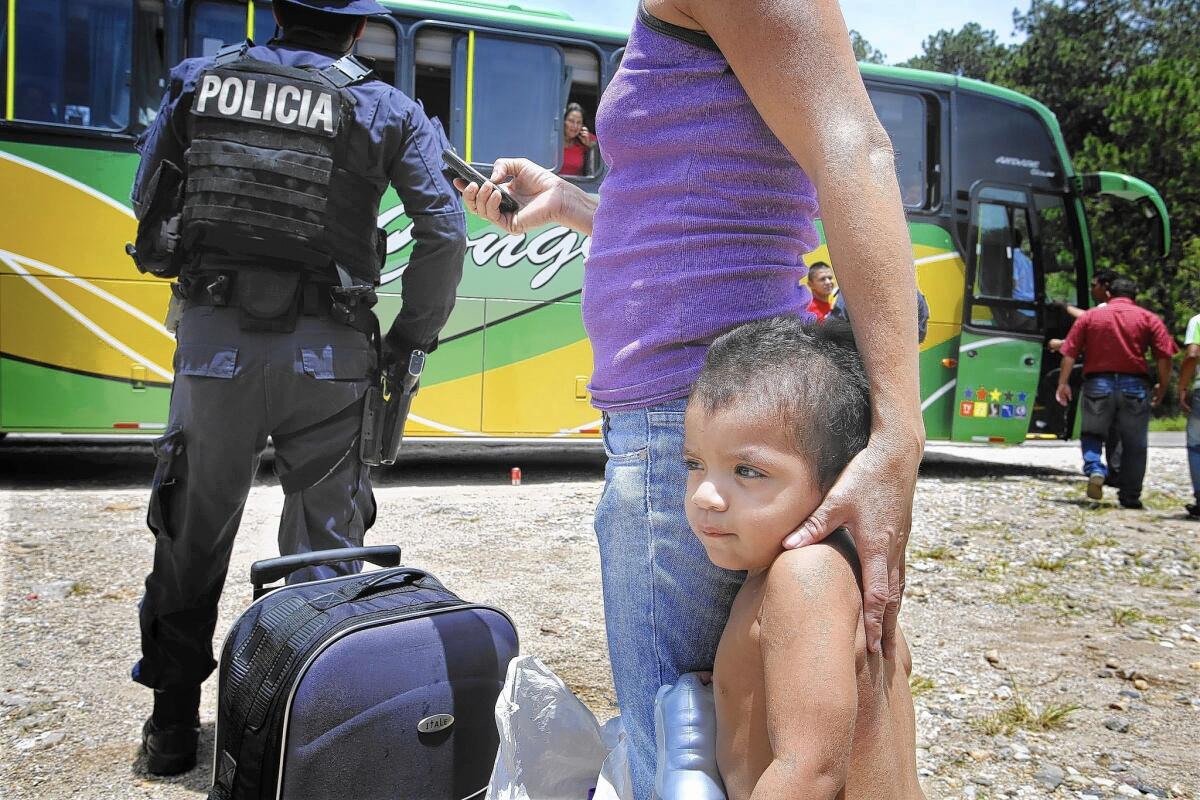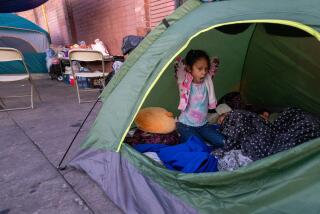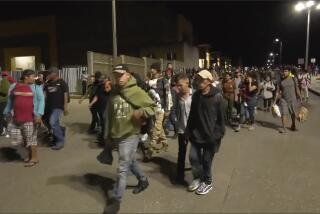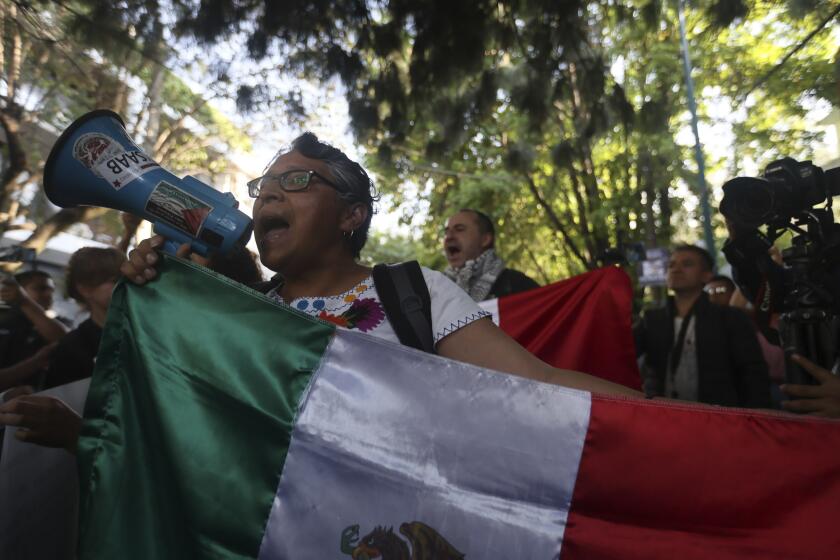Wrenches thrown into careful plans to flee Honduras

The smoke-belching green bus left Ana Maria Ramos and her toddler, Yahir, at the Honduras-Guatemala border and roared off west toward Guatemala City. It had been the single mother’s last chance for safe, legal passage on the first leg of a journey she hoped would eventually land her and her 2-year-old son in Los Angeles.
Now, a skinny, wild-eyed twentysomething man with a pencil mustache tempted her with promises to smuggle them into Guatemala.
It was only 9 a.m. and thunderclouds were building over the lush border town. Ramos looked up at the menacing sky. She held on to Yahir in one arm, and guarded a roller bag and a half-torn plastic sack with the other as she contemplated the smuggler’s offer.
“It’s quick,” he told her. “It’ll be at most about half an hour and you’ll be on the other side.”
For Ramos, 35, the offer was only the latest in a series of difficult choices, stemming from what she views as an impossible situation: raising a youngster in a street gang-infested Honduran city.
For two years, she and the boy’s father, a baker who asked to not be named because of safety concerns, had had run-ins with the gangs.
They had abandoned their home in a suburb of San Pedro Sula. But at least they were alive.
Gang members had shot Ramos’ sister, who lived a few doors down, several times in the face. Her mother died six days later, a death officially attributed to natural causes, but one Ramos insists resulted from her grief. Her brother, who’d long battled depression, committed suicide two weeks later because he could no longer handle so much death, Ramos said.
Ramos had ignored her godmother when she had beseeched her to travel north. This time, she listened.
The plan was to reach Guatemala City, where an acquaintance of the godmother would meet her in a town near Mexico’s porous southern border. There, Ramos and Yahir were to wait until the godmother arrived to accompany them through Mexico, and somehow, into the United States.
::
On a recent morning, with $100 her godmother had sent to get them going, Ramos and her son headed north on a bus. But they never reached the border.
Honduran officials turned them around, saying she needed to obtain written permission from Yahir’s father for the boy to leave the country. Taken aback but determined, Ramos returned by bus late that night to her sister-in-law’s home, in one of the most dangerous suburbs of San Pedro Sula.
She woke up early and called Yahir’s father.
The father said he was fine with Ramos taking Yahir north rather than having their son grow up in “a terrible situation where gangs make no qualms when it comes to hurting a child.”
Eyes darting as he drove his beat-up sedan on a major thoroughfare of the city, the father, a man of serious demeanor, hurried past honking minivans and plumes of exhaust to the home of an attorney who said he could quickly assemble the paperwork.
Before heading into a gated housing community, he nodded toward a pasture.
“You see there. That’s where they throw away the people they kill,” the father said and shook his head. The bodies of those killed by the gangs, he said, are usually left in the brush. “There is no love for life here.”
Yahir smiled obliviously in the back of the car, playing with a plastic spoon.
About 30 minutes and $50 later, the attorney had drawn up the paperwork. The trio then headed to the bus terminal, a concrete scar in the middle of the city.
“We’re going to buy bus tickets,” Ramos told the father. “You wait here.”
Ramos took Yahir by his hand, running past heavily armed guards, vendors hawking cheap T-shirts printed with English phrases and pirated DVDs. Cumbia music competed with a cacophony of chirping magpies that had made the bus terminal their home.
Ramos dished out $68 for two one-way bus fares to Guatemala City. She and her son would leave on the 1 a.m. bus.
::
Ramos had plenty of time to repack her roller suitcase, more than half-full of diapers, clothes and vitamins for Yahir. A tub of baby formula would go in a frayed black plastic bag.
That evening, there were no long goodbyes. No tears. No lingering — just a huge smile on Ramos’ face. Dusk had settled in and Yahir’s father showed up eight hours before the bus’ departure because driving at night was too dangerous, he said. The sky was already nearly dark from a storm setting in.
The father didn’t say much, keeping one hand on the steering wheel and the other free to caress the back of Yahir’s small head, stroking his curly black hair until the boy dozed off. He wiped a tear from his own eye, sniffled and shook his head.
“This is hard. This is hard,” he repeated to himself. “I don’t know if I’ll see him again.”
::
Ramos exited the car, cradling Yahir. The father followed with the bags toward the terminal’s waiting area.
“I don’t know if I’ll see him again,” the father said to himself again and set the bags down. Ramos took a seat, still cradling a sleeping Yahir.
“Send me photos,” he told her. Ramos nodded. Her face wrinkled in an attempt to contain her emotions.
The father put his face to Yahir’s ear.
“Adios,” he said.
“Please take care of him for me,” he told Ramos.
She nodded.
“OK. OK,” she said.
::
Ramos used her hand to fan Yahir as he slept in the terminal’s steamy waiting room, occasionally wiping the sweat on his brow.
When a big green bus pulled up, Ramos threw Yahir over her shoulder and scurried to the front of the line. A young couple helped her with her two bags. The bus left earlier than scheduled.
An hour later, local Honduran police stepped aboard.
“Documents please,” a stocky police official ordered the passengers.
“Do you have authorization from the father?” he asked Ramos. Her hand shaking, she handed him the papers.
After several more hours of travel, an agent with an elite Honduran unit — funded by the U.S. State Department — stopped the bus, asking each of the passengers for documents. These were the same officials who’d stopped Ramos a few days earlier because she didn’t have the father’s authorization.
“Again?” one of the agents said, recognizing Ramos and Yahir. This time she had the letter. This time, they let her through.
Thirty minutes later, an immigration official ordered everyone off the bus.
“Ladies: Children without passports will not be allowed to leave the country,” an immigration official who towered over Ramos said loudly.
Her eyes opened wide.
“I hope to God that’s not the case,” Ramos said to herself.
Yahir wiped the sleep from his eyes, blinking repeatedly to adjust to the sunlight.
“But I have the father’s permission,” she pleaded. “You have to let me through.”
“These are new orders from the president” of Honduras, the man shouted.
Ramos called her godmother while Yahir played on a plastic chair.
“I have a problem,” Ramos told her.
::
The scrawny smuggler with the pencil mustache lingered just steps away from the immigration office.
“I can take you to the other side,” he told Ramos.
“How?” Ramos asked.
“This area is full of blind spots, through the brush,” he said. “It’s 1,000 lempiras [$50] for you and the boy.”
The clouds gave way to light rain. Ramos sighed.
“I only have 200 lempiras,” she told him. He shrugged, tilted his head and put his hands in his pockets before slipping away.
It was just enough to buy a one-way ticket for herself and Yahir. They took the next bus at 11 a.m. — this one back to San Pedro Sula.
More to Read
Start your day right
Sign up for Essential California for news, features and recommendations from the L.A. Times and beyond in your inbox six days a week.
You may occasionally receive promotional content from the Los Angeles Times.







